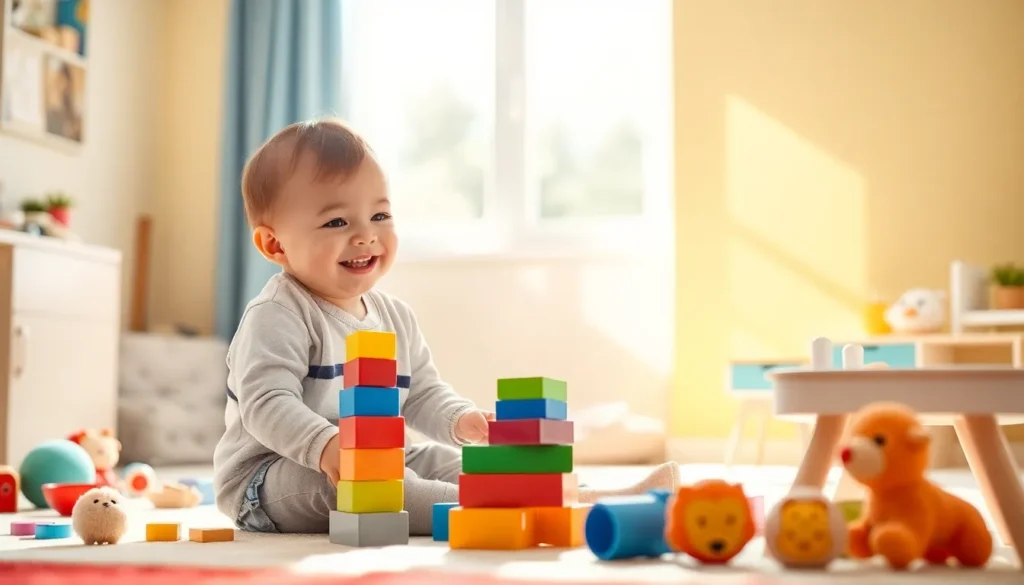Table of Contents
ToggleEvery parent dreams of raising a confident toddler who can conquer the world—one wobbly step at a time. But let’s face it: toddlers can be unpredictable little creatures, prone to meltdowns over mismatched socks or the existential crisis of a lost toy. Building confidence in these pint-sized humans isn’t just a nice-to-have; it’s essential for their growth and development.
Understanding Toddler Confidence
Understanding toddler confidence involves recognizing its role in overall development. Many parents notice that confident toddlers display independence and resilience.
The Importance of Early Confidence
Early confidence lays the foundation for lifelong self-esteem. Children who feel secure often explore their environment fearlessly. They engage more readily with peers and express their needs clearly. In fact, studies show that confident toddlers perform better in school settings. When a child embraces challenges, they develop problem-solving skills. This growth fosters a positive cycle reinforcing their belief in abilities.
Developmental Milestones
Developmental milestones offer insights into toddler confidence. By ages 1 to 3, toddlers experience significant growth in motor and social skills. They begin walking, talking, and engaging in play, which enhances their self-assurance. Achievements such as using utensils or playing with others often lead to increased pride. Each small success contributes to a child’s sense of accomplishment. As they master new tasks, their confidence generally expands, making them eager to tackle new challenges. Understanding these stages helps parents support and nurture their child’s development effectively.
Strategies for Building Confidence in Toddlers

Building confidence requires intentional strategies, focusing on fostering independence and using positive reinforcement.
Encouraging Independence
Encouraging independence helps toddlers develop self-assurance. Allowing them to complete simple tasks like dressing or feeding themselves promotes autonomy. Parents can provide choices, such as selecting clothes or snacks. Such options help toddlers feel empowered. Gradually introducing responsibilities, like picking up toys, nurtures a sense of accomplishment. This approach also aligns with developmental milestones between ages 1 to 3, where motor skills significantly improve. Opportunities to explore their environment independently further enhance confidence. Parents should recognize and celebrate small successes, reinforcing toddlers’ efforts as they learn to do things on their own.
Positive Reinforcement
Positive reinforcement significantly boosts toddlers’ confidence levels. Acknowledging their achievements with praise encourages them to try new things. Using specific compliments, such as “You did a great job putting those blocks together,” provides meaningful feedback. Recognizing efforts instead of just results fosters a growth mindset. Consistency in acknowledging even minor successes creates a supportive atmosphere. When they face challenges, offering encouragement can motivate them to persevere. Avoiding criticism helps maintain their self-esteem. Through these methods, parents can build resilience in their toddlers, laying a solid foundation for future endeavors.
Activities to Foster Confidence
Engaging in specific activities promotes confidence in toddlers. These activities not only enhance their skills but also create a sense of achievement.
Interactive Play
Interactive play benefits toddlers’ social and cognitive development. Activities like building blocks or playing with soft toys encourage teamwork and problem-solving. Through these interactions, toddlers learn to express themselves and collaborate with peers. Role-playing games such as pretending to be animals or superheroes boost creativity. Such scenarios provide a safe space for exploration and self-expression.
Storytelling and Role Play
Storytelling acts as a powerful tool for building confidence. Reading stories together fosters imagination while teaching essential values. Toddlers can relate to characters, enabling them to see themselves in various situations. Additionally, role play allows them to practice scenarios they encounter in daily life. Expressing feelings and resolving conflicts through acting out stories enhances communication skills. Both storytelling and role play develop empathy and social understanding.
Parental Involvement
Parental involvement plays a vital role in building confidence in toddlers. Engaged parents create a nurturing environment that fosters growth and development.
Role of Parents and Caregivers
Parents and caregivers significantly influence a toddler’s self-esteem. They model behaviors, demonstrate effective communication, and provide emotional support. Such interactions help establish trust, allowing children to explore their surroundings with assurance. Engaging in play alongside toddlers aids skill development and strengthens bonds. Observing caregivers celebrate achievements reinforces toddlers’ sense of accomplishment. Additionally, caregivers can encourage independence by allowing toddlers to make choices, which enhances their problem-solving skills.
Creating a Supportive Environment
Creating a supportive environment is essential for boosting toddler confidence. A consistent routine provides stability, letting children know what to expect. Safe spaces for exploration encourage risk-taking and promote resilience. Parents can offer praise for effort, not just results, to cultivate a growth mindset. Setting up playdates fosters social interactions, helping toddlers develop crucial social skills. Limiting critical feedback reduces fear of failure, allowing children to approach challenges with confidence. Overall, a supportive atmosphere empowers toddlers to thrive and explore their capabilities.
Building confidence in toddlers is a journey that requires patience and intentionality. By fostering independence and celebrating small achievements parents can create an environment where toddlers feel secure to explore and learn. Engaging in interactive play and storytelling not only enhances their developmental skills but also nurtures their imagination and social understanding.
Parental involvement plays a crucial role in this process. By modeling positive behaviors and providing emotional support parents can significantly impact their child’s self-esteem. Creating a supportive atmosphere with consistent routines allows toddlers to thrive and develop the confidence they need to face future challenges. With the right approach parents can empower their little ones to grow into resilient and self-assured individuals.







